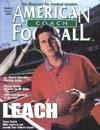Article CategoriesAFM Magazine
|
The SurvivorTennessee\'s Jeff Fisher has thrived in the face of titanic problemsby: Richard Scott © More from this issue Here he was, scaling a fence in a driving thunderstorm, with a blank videocassette under his rain jacket. The coaching staff desperately needed video of its next opponent, but a lack of sufficient technology at the team's training facility prevented the team from finding the game on television. That did not, however, prevent the team's head coach from finding another solution. So with the rain pouring down and thunder rumbling overhead, he found himself climbing the fence between the team's practice facility and a sports bar, videocassette in hand, so he could ask the bartender to tape the game. This wasn't a small high school team in a rural community, nor was it a tiny non-scholarship college program. This wasn't even a semi-pro team. This was Jeff Fisher, head coach of the NFL's Tennessee Titans."I fe....The full article can only be seen by subscribers.
|
|
|||||||
| HOME |
MAGAZINE |
SUBSCRIBE | ONLINE COLUMNISTS | COACHING VIDEOS |
Copyright 2025, AmericanFootballMonthly.com
All Rights Reserved





